Borador
Canis lupus
Boradors make excellent police dogs and are used often on search and rescue missions.
Advertisement
Borador Scientific Classification
- Kingdom
- Animalia
- Phylum
- Chordata
- Class
- Mammalia
- Order
- Carnivora
- Family
- Canidae
- Genus
- Canis
- Scientific Name
- Canis lupus
Read our Complete Guide to Classification of Animals.
Borador Conservation Status
Borador Facts
- Fun Fact
- Boradors make excellent police dogs and are used often on search and rescue missions.
- Temperament
- Energetic and eager to please
- Diet
- Omnivore
Borador as a Pet:
- General Health
- Energy Level
- Shedability
- Trainability
- Intelligence
- Tendency to Chew
- Size
- Family and kid friendliness
- Yappiness / Barking
- Moderate
- Separation Anxiety
- Moderate
- Preferred Temperature
- Cold climate
- Exercise Needs
- High
- Friendly With Other Dogs
- High
- Pure bred cost to own
- $200 to $500
- Dog group
- Working
- Male weight
- 45-65 lbs
- Female weight
- 40-60 lbs
This post may contain affiliate links to our partners like Chewy, Amazon, and others. Purchasing through these helps us further the A-Z Animals mission to educate about the world's species.
View all of the Borador images!
Boradors make excellent police dogs and are used often on search and rescue missions.
A borador is a dog bred from Labrador retriever and border collie lines. As the descendent of an energetic working dog lineage on two sides, the borador is an intelligent, spirited canine who needs lots of activity both to burn off boundless energy and to keep boredom at bay since boredom can lead to destructive habits. Boradors typically inherit their Lab parents’ gentle disposition and their collie parents’ protective instincts, so they’re terrific at dog sports like obedience and agility, and they also make excellent service dogs.
See all of our expert product reviews.
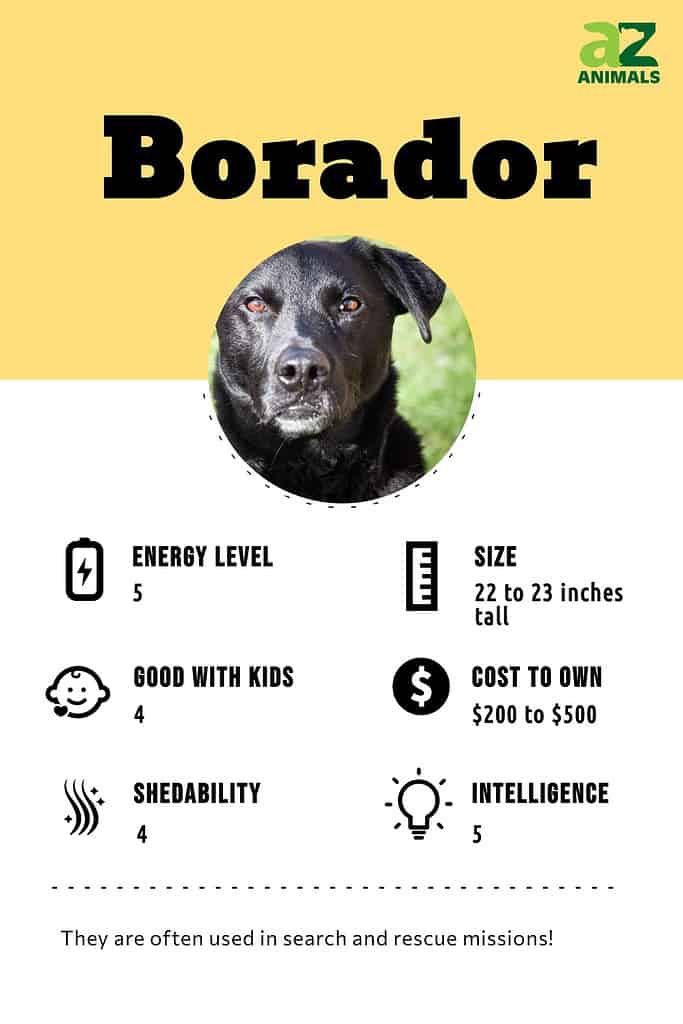
3 Pros And Cons Of Owning Boradors
| Pros! | Cons! |
|---|---|
| They’re very intelligent: A borador is really smart and can be trained to do many different things. They will be eager participants in agility, obedience, and tracking trials. Police train them as search and rescue dogs as well as bomb- and narcotic-sniffing dogs. | They’re easily bored: Boradors don’t like being cooped up in a small space with nothing to do. If you leave them alone in a small space like an apartment too often, you’re likely to return home and find them chomping amiably on your expensive shoes. Lab/collie hybrid puppies chew a lot and need extensive training to break the habit. |
| They’re friendly: They’ll get along with every member of your family, even with Grandpa who says he doesn’t like the canine kind. They’ll cozy up to the other animals in your household, too, although they may have a tendency to herd your smaller pets and children. | They shed: If you’re looking for a hypoallergenic dog, the borador ain’t it. Boradors shed all year round, making vigorous brushing several times a week a must. |
| They’re active: Are you looking for a pet who will knock you out of your couch potato lifestyle? You’ve found her. Boradors adore the outside life. In addition to walking, hiking, and running, they also love to swim. | They can become obese: A borador inherits a healthy appetite from its two working dog parents. Unfortunately, many boradors don’t work enough to burn off all the calories they want to chow down. The result? They can get fat, which is dangerous to their health. |

©Wirestock Creators/Shutterstock.com
History And Origin
Like most hybrid dogs, the borador is a relatively new and recognized breed, having been around for about 10 to 20 years. This dog comes from the popular labrador and the border collie, two breeds with an impressive history. The labrador originates from Canada having evolved from the St. John’s water dog, a breed that became extinct in the 1980s. It is still debatable as to which came first – the Newfoundland dog which may have paved the way for the St. John’s water dog, or the St. John’s water dog, which may have led to the breeding of the Newfoundland, but either way, it led to the labrador.
The border collie is an even older breed and it is believed to be a combination of small, spitz-type dogs that the Viking raiders brought with them in the third century and larger herding dogs that the Romans brought with them during the invasion of Britain in the first century. This is thought to be the most intelligent dog breed.
Size And Weight
A borador can be medium size, or they can be large dogs. Male boradors stand 20 to 23 inches tall and weigh 45 to 60 pounds. Female boradors are slightly smaller in size at 19 to 22 inches and 40 to 60 pounds.
| Height (Male) | 23’’ Tall |
| Height (Female) | 22” Tall |
| Weight (male) | 45-65 lbs., fully grown |
| Weight (female) | 40-60 lbs., fully grown |
Common Health Issues
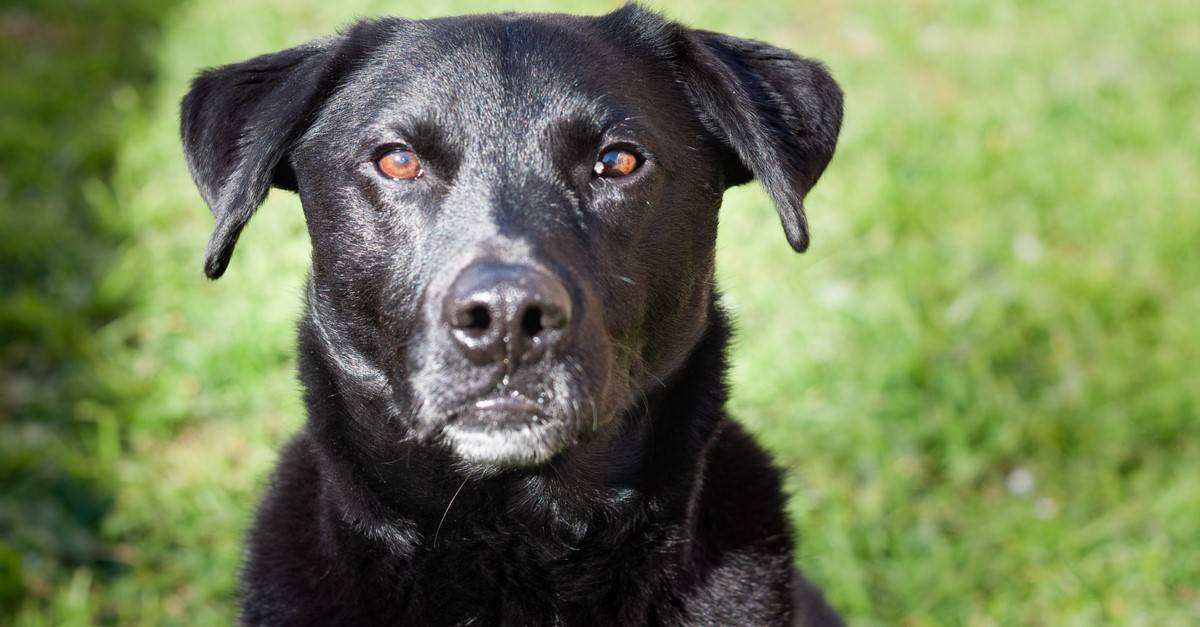
This mixed-breed can expected to be healthier than the purebred parent but they are still prone to health issues.
Health and Entertainment for your Borador
See all of our expert product reviews.
©KPStollery/Shutterstock.com
As a hybrid canine, boradors can generally be expected to be healthier and more robust than their parent stock since crossbreeding introduces genetic diversity or “hybrid vigor.” However, canine genetics isn’t the only factor that determines a dog’s health.
Like their collie forbears, boradors are prone to skeletal growth abnormalities like hip dysplasia and elbow dysplasia, and these can be exacerbated if your collie/Lab mix gains too much weight. Some boradors can develop allergies that manifest as skin rashes or hay fever-like symptoms. A borador may also be at risk for developing a condition called “Collie Eye Anomaly,” in which the retina detaches from underlying blood vessels. Responsible breeders will have genetic tests performed on the puppies they sell so that prospective buyers will be aware of any health issues that could arise when pups are fully grown.
- Hip dysplasia
- Elbow dysplasia
- Allergies
- Collie Eye Anomaly
Temperament
The word that describes the personality of borador puppies best is “bouncy”: He or she has seemingly unlimited amounts of physical and mental energy. With consistent, firm, and loving training, your pup’s behavior will mellow as he or she reaches maturity, but it’s important to keep in mind that a happy borador is a busy borador. If your lifestyle won’t offer your dog an opportunity for the positive expression of traits like energy, curiosity, and the desire to get involved, then the borador is not the canine for you. Although boradors are typically friendly even to strangers, barking can be an issue. Barking is generally your borador’s way of letting you know: Something new has come up!
How To Take Care Of A Borador
Certain factors must be taken into consideration when an owner is confronted by a dog that’s active, inquisitive, and as smart as the average two-year-old human child. New borador owners must pay special consideration to their pet’s diet, grooming, exercise, and training needs.
The Best Dog Food For Boradors
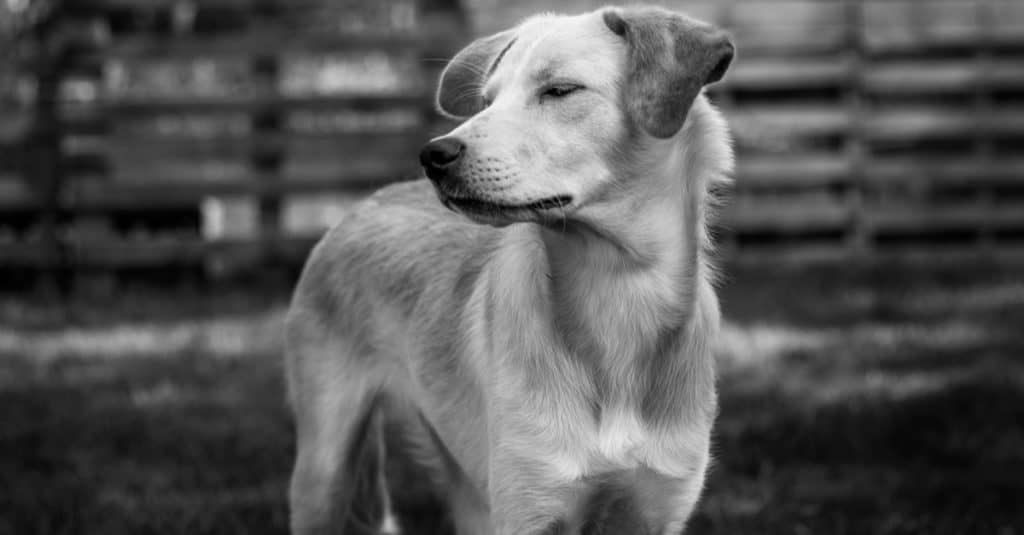
An adult borador should have meals spread out to avoid bloat.
©Shelley Bibby/Shutterstock.com
Feed your adult borador one and a half to two cups of high-quality kibble, depending upon your dog’s activity levels. A good rule of thumb is to allot 20 calories for each pound of weight. Medium and large-size canines are at increased risk for bloat, so it’s best to spread out your borador’s meals and feed him twice a day. Canned food can be bad for canine dental hygiene, so stick to kibble with the occasional cooked meat or veggie treat.
Puppies under six months old will require more calories and more frequent feedings. Check with your veterinarian if you have questions and think about trying limited-ingredient dog food if your borador struggles with allergies.
A-Z Animals’ top pick as the best dog food for Boradors is Natural Balance Limited Ingredient Diet | Adult Dry Dog Food with Healthy Grains.
This dog food uses more selective ingredients than most, with lamb and brown rice as alternative protein and fiber sources that are less likely to initiate allergies in boradors. There’s taurine for eye problem prevention, with vitamin E and zinc for additional relief from any skin irritation your borador has alongside their allergies. There’s copper for the connective tissues, calcium for bones and joints, and amino acids to build muscle.
Check out Natural Balance Limited Ingredient Diet Healthy Grains Dog Food on Chewy or Amazon.
- Lamb and brown rice recipe for small breeds
- Balanced nutrition supports heart, immune system, bones, joints, digestion
- Omega 3 and 6 fatty acids for healthy skin and coat
Maintenance And Grooming
No two border collie/Lab mixes look exactly alike, and no two will have the same grooming needs. The color and consistency of your borador’s coat will depend upon which parental strain is dominant. Coat colors include black, tan, chocolate, piebald blue, and piebald red.
These canines shed, so you will want to brush your pet vigorously a few times a week, particularly in the spring and autumn when the dog is molting. They don’t need to be bathed more often than every couple of weeks unless they’ve rolled around in something disgusting: Like their parent border collie, their coats are more-or-less self-cleaning. Labrador retrievers are prone to excessive ear wax buildup, so check your borador’s ear’s often, and consult with your vet if excess cerumen becomes a problem. Like all canines, your borador will benefit from daily tooth brushing and weekly nail clipping.
Training
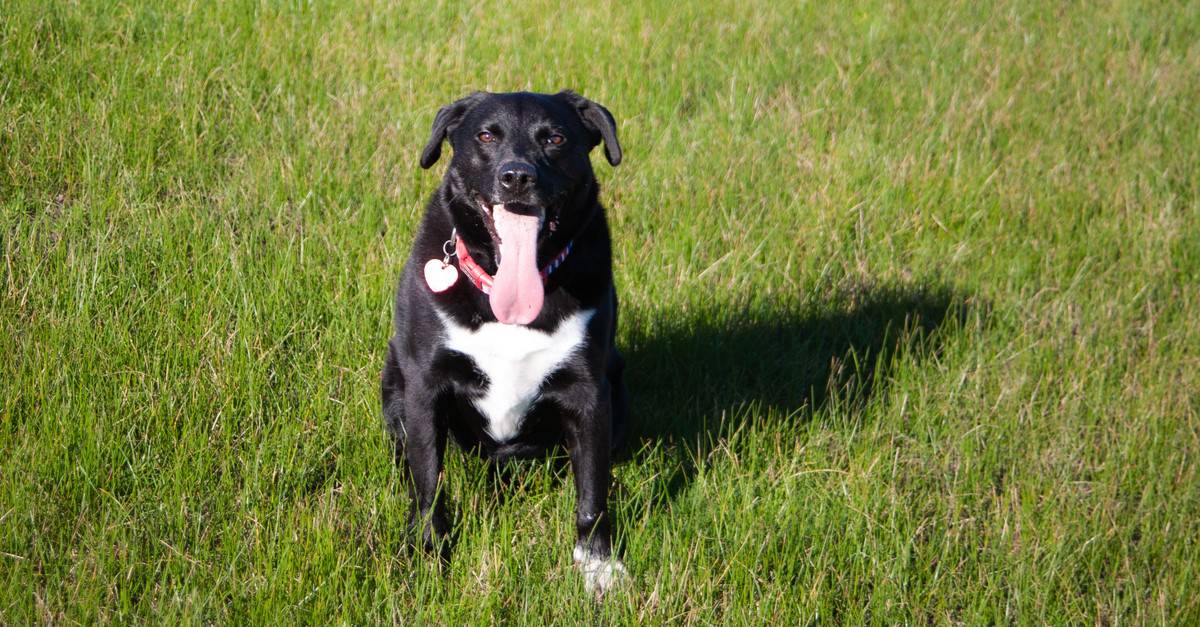
This breed is capable of learning a lot which is why they make excellent service dogs.
©KPStollery/Shutterstock.com
Your borador is capable of learning just about anything you’re up for teaching. That’s why these canines make such excellent service dogs. These dogs delight in learning. You can start housebreaking puppies at eight weeks old, and if your training routine is consistent and includes rewards like a treat or a toy, you’ll be amazed by how quickly this dog progresses. Boradors disprove the adage that an old dog can’t learn new tricks. Long after they’re full-grown, these dogs will continue to learn amazing new feats so long as training is approached in the right spirit.
Exercise
Your dog’s heritage makes him or her a very active dog. You can take this canine on hikes or to the beach, and they love playing with their canine pals at the dog park. They excel at dog sports like obedience, agility, rallies, and flyball. Expect to spend upwards of 60 minutes a day exercising your dog.
Puppies
These puppies love to chew, and unchecked they will chew anything, including shoes, eyeglasses, dirty laundry, and fingers. Make sure you have plenty of chew toys and natural bones specifically sold for chewing. Your pup will quickly learn the difference between what’s permissible to chew and what isn’t with consistent, gentle training.
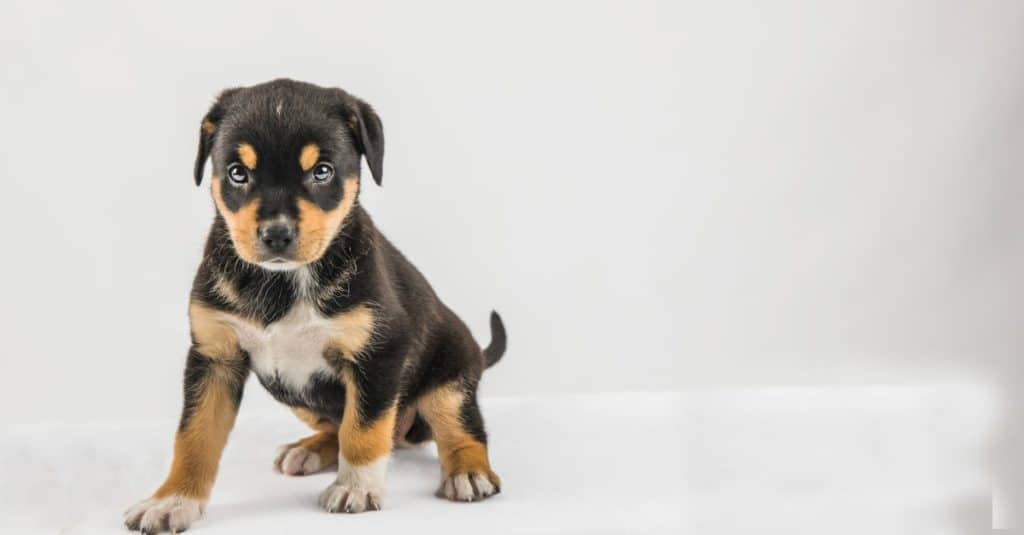
These puppies love to chew so make sure you have plenty of toys around to avoid them ruining your household items.
©Ursula Page/Shutterstock.com
Boradors And Children
These dogs are outgoing and affectionate. They do have herding behaviors, however, and may nip a small child gently on the ankle if they think that child is moving too slowly. Proper training will benefit both dogs and human children here. Generally speaking, border collie/Lab hybrid canines are good even with young children once they’ve been taught the rules of engagement.
Dogs Similar To Boradors
Three dogs that share many similarities with the borador are the labradoodle, the goldador, and the aussiedor.
- The Labradoodle: The labradoodle is a hybrid cross between a Labrador retriever and a poodle. Unlike the borador, the labradoodle is hypoallergenic. These gentle, playful canines are one of the most popular of all designer dog breeds.
- The Goldador: Do you love retrievers? Then the goldador, a mix between a golden retriever and a Labrador retriever, may be the perfect canine for you. Like boradors, these dogs are easily trained to be service dogs because of their friendly personalities and high intelligence.
- The Aussiedor: Aussiedors is a cross between a Labrador retriever and an Australian shepherd. They make excellent companions for anyone who enjoys hikes and runs, but they do shed an enormous amount.
Popular Names For Boradors
Popular names for these dogs include:
- Max
- Charlie
- Bear
- Bella
- Lola
Borador FAQs (Frequently Asked Questions)
How much does a Borador cost to own?
Borador puppies are typically more affordable than other hybrid crossbreeds, and you may be able to find puppies from dependable breeders priced between $200 and $500. Visits to the vet for vaccines, neutering, and microchipping are likely to set you back another $600. You’ll spend another few hundred dollars on crates, bedding, food bowls and leashes, and possibly another $100 on toys. Borador puppies really like toys. So do full-grown borador dogs for that matter.
Thereafter, you can expect to spend between $1,000 to $1,500 a year on your borador.
Are Boradors good with kids?
Boradors are good with children of all ages so long as they have been trained not to herd young children.
How long do Boradors live?
Boradors typically live between 10 and 15 years.
What Is a Borador?
A borador is a cross between the Labrador retriever and the border collie breeds.
Are Boradors Aggressive?
Boradors are not aggressive in the sense of physically attacking humans and other animals around them. However, they do keep watch over their territory. They’re alert. If there’s a change they think their human owner should know about, there’s likely to be some barking.
Are Boradors Smart?
Boradors are extremely smart.
How Much is a Borador Puppy?
Borador puppies can cost between $200 and $500. Price variations depend upon what parent stock breeders are using.
Are Boradors Hypoallergenic?
Boradors are not hypoallergenic.
Thank you for reading! Have some feedback for us? Contact the AZ Animals editorial team.
Sources
- Dog Time, Available here: https://dogtime.com/dog-breeds/borador#/slide/1
- Dog Zone, Available here: https://www.dogzone.com/crossbreeds/borador/
- Wag!, Available here: https://wagwalking.com/breed/borador
- Perfect Dog Breeds, Available here: https://www.perfectdogbreeds.com/border-collie-lab-mix/
- VCA Hospitals, Available here: https://vcahospitals.com/know-your-pet/collie-eye-anomaly
- Dog Breeds 911, Available here: https://www.dogbreeds911.com/borador-pros-and-cons.html
- Perfect Dog Breeds, Available here: https://www.perfectdogbreeds.com/border-collie-lab-mix/
- Pet Guide, Available here: https://www.petguide.com/breeds/dog/borador/#
- All Things Dogs, Available here: https://www.allthingsdogs.com/border-collie-lab-mix/
- K9 Web, Available here: https://www.k9web.com/breeds/border-collie-lab-mix/


















